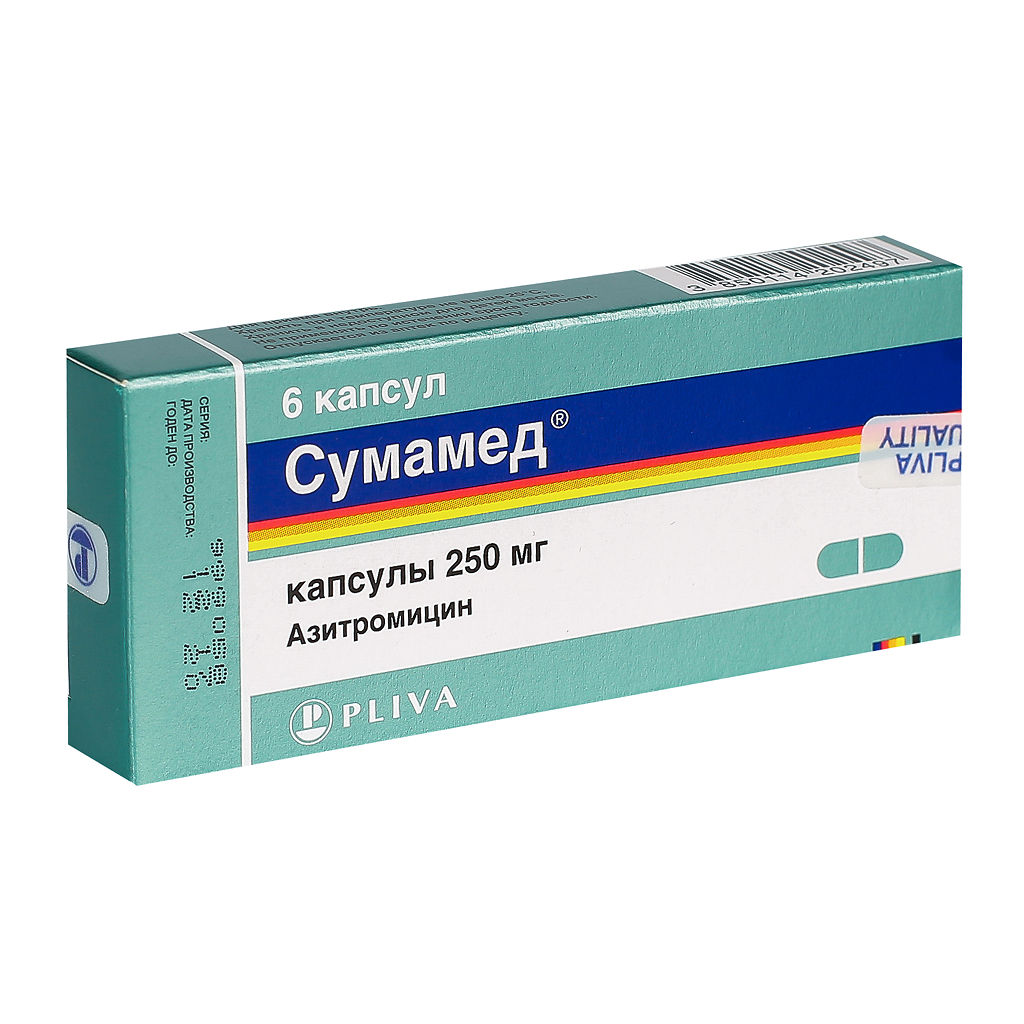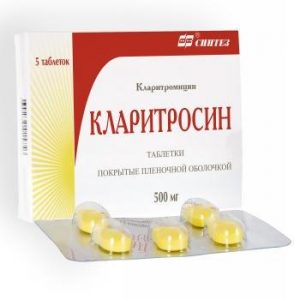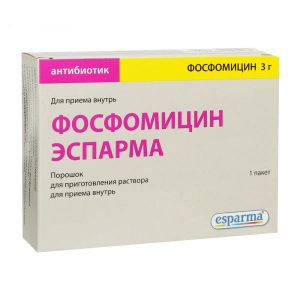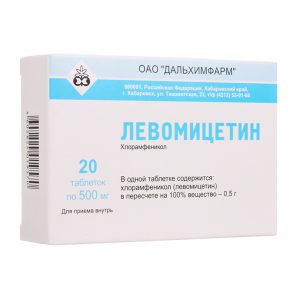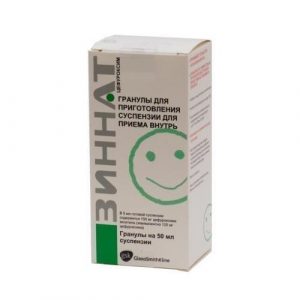Description
Latin name
Sumamed
Packing
6 capsules.
Pharmacological action
Antibiotic macrolide group – azalide. It has a wide range of antimicrobial effects. It binds to the 50S subunit of the ribosome, inhibits the biosynthesis of protein microorganisms. In high concentrations it has a bactericidal effect.
Azithromycin is active against gram-positive aerobic bacteria: Streptococcus pneumoniae, Streptococcus pyogenes, Streptococcus agalactiae, Streptococcus viridans, streptococci groups C, F and G, Staphylococcus aureus, Staphylococcus epidermidis bacteriaphyriform bacteria.
Azithromycin is active against gram-negative aerobic bacteria: Haemophilus influenzae, Haemophilus parainfluenzae, Haemophilus ducreyi, Moraxella catarrhalis, Bordetella pertussis, Bordetella parapertussis, Neisseria gonorrhoeae, Neisseria meningitidis, Helicobacter pylori, Gardnerella vaginalis, Campylobacter jejuni.
Azithromycin is also active against intracellular and other microorganisms: Mycobacterium avium complex, Legionella pneumophila, Chlamydia trachomatis, Chlamydia pneumoniae, Mycoplasma pneumoniae, Ureaplasma urealyticum, Listeria monocitogenes, Borrelia burgerferma burgfer.
Gram-positive bacteria resistant to erythromycin are resistant to the drug.
Indications
Infectious and inflammatory diseases caused by microorganisms sensitive to the drug: – upper respiratory tract infections and ear infections (bacterial pharyngitis, tonsillitis, sinusitis, otitis media)
– lower respiratory tract infections (bacterial bronchitis, interstitial pneumonia exacerbation of chronic bronchitis)
– infections of the skin and soft tissues (chronic migratory erythema – the initial stage, Lyme disease, erysipelas, impetigo, secondary dermatoses)
– sexually transmitted infections (urethritis, cervicitis)
– diseases of the stomach and duodenum, with Helicobacter pylori.
Contraindications
– severe hepatic and renal impairment
– hypersensitivity to the
macrolide group antibiotics Precautions: during pregnancy and lactation, with impaired liver and kidney function, in patients with impaired or predisposed arrhythmias and QT prolongation.
Use during pregnancy and lactation
During pregnancy, the drug should be administered only if the expected benefit to the mother outweighs the potential risk to the fetus. If it is necessary to administer Sumamed to women during lactation, it is necessary to decide on the termination of breastfeeding.
Composition
1 capsule contains azithromycin dihydrate 250 mg
Dosage and administration
The drug is prescribed orally 1 time per day. Capsules are taken at least 1 hour before or 2 hours after a meal.
Children 6 months of age and over are recommended to use the drug in the form of a suspension for oral administration or tablets of 125 mg
For infections of the upper and lower respiratory tract, skin and soft tissues (except for chronic migratory erythema), the drug is prescribed for adults at a dose of 500 mg 1 time / days for 3 days, the course dose is 1.5 g.
Children are prescribed at the rate of 10 mg / kg body weight 1 time / day for 3 days, the course dose is 30 mg / kg.
In chronic erythema migrans: for adults, the drug is prescribed 1 time / day for 5 days: 1 day – 1 g (2 tablets of 500 mg), then from 2 to 5 days – 500 mg, course dose of 3 g.
Children are prescribed 1 day in a dose 20 mg / kg body weight and then from 2 to 5 days – daily at a dose of 10 mg / kg body weight, course dose of 60 mg / kg.
Drug interactions
Antacids (containing aluminum, magnesium), ethanol and food intake significantly reduce the absorption of azithromycin (capsules and suspension), so the drug should be taken at least 1 hour before or 2 hours after taking these drugs and food.
Azithromycin, unlike other macrolide antibiotics, does not bind to isoenzymes of the cytochrome P450 system. To date, there has been no interaction with theophylline, terfenadine, carbamazepine, triazolam, digoxin.
Macrolides with concomitant use with cycloserine, indirect anticoagulants, methylprednisolone, felodipine and microsomal oxidation preparations (cyclosporine, hexobarbital, ergot alkaloids, valproic acid, disopyramide, bromocriptine, oral hypoglycemic agents), slow down excretion, increase the concentration and toxicity of these drugs, while with the use of azalides such an interaction has not been observed to date.
If co-administration with warfarin is necessary, careful monitoring of prothrombin time is recommended.
With the simultaneous administration of macrolides with ergotamine and dihydroergotamine, their toxic effects (vascular spasm, dysesthesia) may occur.
Lincosamines decrease, while tetracycline and chloramphenicol increase the effectiveness of azithromycin.
Pharmaceutically azithromycin is not compatible with heparin.
Overdose
Symptoms: nausea, vomiting, diarrhea, temporary hearing loss.
Treatment: symptomatic.
Store
in a child-friendly environment at 15 ° C to 25 ° C.
Shelf life
3 years.
Deystvuyushtee substance
Azithromycin
Terms and conditions
prescription
dosage form
capsules
Prescription
Prescription
For children prescribed by a doctor, Children over 12 years of age, Adults prescribed by a doctor, Pregnant as prescribed by a doctor
Pliva Hrvatska d.o., Croatia
